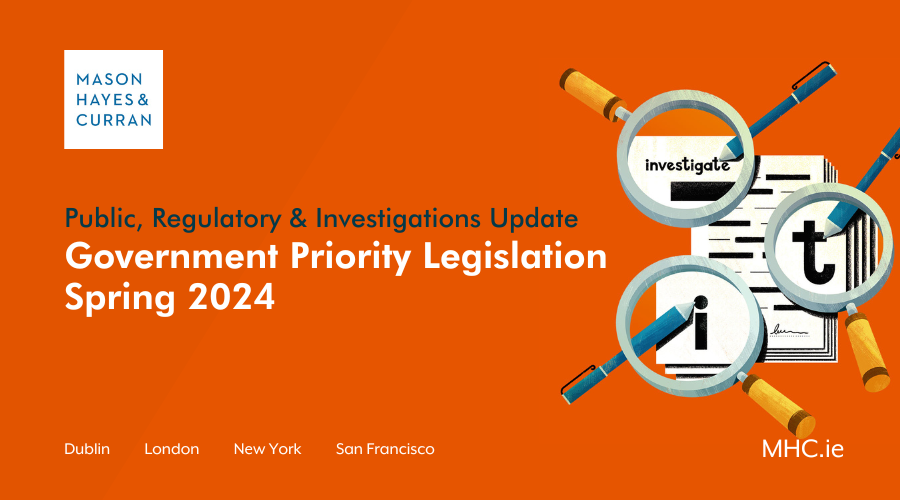Government Priority Legislation Spring 2024

The Government has published its spring Priority Legislative Programme. The focus continues to be on key areas of housing, health, justice, defence and finance. Our Public, Regulatory & Investigations team highlights some key features of the proposed legislation.
The spring Legislative Programme comprises 46 priority pieces of draft legislation (Bills). As with the last three legislative programmes these 46 priority bills are divided into two categories: 24 for priority publication and 22 bills marked for priority drafting in this Dáil term.
Chief Whip, Hildegarde Naughton TD, in announcing the Government’s spring Legislative Programme stated that “A key Government priority is ensuring that all members of society are safe on the streets and in their communities. Organised crime often preys on the most vulnerable with the Irish crime market valued at €1.7 billion per annum.”
This Legislative Programme is notable as it may be one of the last programmes presented by the current Government. The full programme can be accessed online.
We consider some of the key pieces of draft legislation below.
Housing and Property
This remains a priority feature. This term, the Government aims to introduce key measures to ensure continued supply and access to housing. The Registration of Short-Term Tourist Letting Bill requires all properties listed for short-term and holiday let to be registered with Fáilte Ireland. This will result in stringent requirements for those who operate holiday rentals for periods of up to and including 21 days, including potential prosecution for failure to hold a valid registration number.
The Residential Tenancies (Right to Purchase) Bill will afford tenants in rental properties a right of first refusal to purchase those properties when they are put up for sale. The aim is to protect tenants from eviction. It is also envisaged that the scheme will facilitate more convenient sales for landlords.
In addition, the Health (Miscellaneous Provisions) Bill seeks to remove certain income derived from the Rent-a-Room scheme from the Medical Card and GP visit income assessment process. The aim is to remove barriers to participation in the Rent-a-Room scheme, and therefore potentially alleviating the shortage of accommodation for students and other renters.
Public sector
The Civil Service Regulation and Public Service Management (Amendment) Bill will amend the previous Civil Service Regulations. The proposed legislation will provide that disciplinary action up to and including dismissal in the civil service can be assigned below the level of the head of the organisation.
Work is underway on the EU Data Bill which will transpose the EU Data Regulation into Irish Law. The aim of the Regulation is to create a harmonised framework within the EU on fair access and use of data, and to provide clarification on who can create value from data and under which conditions. This Bill needs to be passed into national law by 12 September 2025.
Health
Among the health legislation for priority drafting is the Health (Amendment) (Licensing of Professional Home Support Providers) Bill. This will provide a regulatory framework for the licensing of home support providers to ensure that all service users are provided with high-quality care in accordance with HIQA national standards. The new law will require all home support and home care providers to hold a licence from HIQA.
The Health (Amendment) (No. 2) Bill has been prioritised, following completion of pre-legislative scrutiny in December 2022. This Bill aims to strengthen regulatory measures to enhance governance and oversight of nursing homes and other designated centres. In addition, the Prohibition of Conversion Practices Bill aims to end the practice of conversion therapy in Ireland.
Finance
Following the Government’s Retail Banking Review in November 2022, the Minister for Finance proposed the Access to Cash Bill in an effort to preserve access to cash, and to regulate ATMs and Cash in Transit operators.
Policing and Defence
The Garda Síochána (Recording Devices) (Amendment) Bill is in preparation in the wake of the November 2023 Dublin riots. The purpose of this Bill is to allow Gardaí to use the controversial Facial Recognition Technology (FRT) in specific circumstances. It will allow Gardaí retrospectively to search images which are legally in the possession of An Garda Síochána regarding specific serious offences.
The draft of Defence (Amendment) Bill was approved in December 2023 following the publication an independent review group report into bullying, harassment and sexual misconduct within the Defence Forces. It will examine the effectiveness of policies and procedures within the Defence Forces for dealing with allegations of this behaviour. It give statutory footing to the Minister of Defence to authorise members of the defence forces to engage with trade unions, namely ICTU.
Miscellaneous
Preparation is underway for the drafting of The Forty-first Amendment of the Constitution (Unified Patent Court) Bill. This is to provide for the extension of the Unified Patent Court to Ireland, which will in turn provide a central forum for patent litigation in the EU. A date of June 2024 is presumed for a referendum, to coincide with the local and EU elections.
Work remains ongoing on the Defamation (Amendment) Bill in light of a statutory review of the Defamation Act 2009. The major areas identified for examination include a proposed end to jury trials in High Court defamation proceedings and measures against so-called SLAPPs (strategic lawsuits against public participation).
Conclusion
The 2024 spring Legislative Programme potentially marks the last Legislative Programme put forward by the current Government. This has given rise to several Bills put forward in an effort to align with their “Programme for Government”. Work has also continued on a number of key pieces of legislation from the summer and autumn Legislative Programmes. It remains to be seen which of these proposals will materialise this term.
For more information on the Government’s Legislation Programme, contact a member of our Public, Regulatory & Investigations team.
The content of this article is provided for information purposes only and does not constitute legal or other advice.
Share this:



